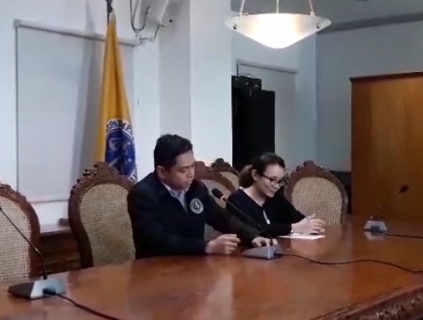
(Eagle News)–Over 2000 persons deprived of liberty have surrendered to authorities following the 15-day deadline imposed by President Rodrigo Duterte, a figure the Department of Justice said was bloated because it includes even those who turned themselves in even if they were not released under the Good Conduct Time Allowance law.
In a press conference on Friday, Sept. 20, Justice Undersecretary Markk Perete said the figure as of 5 a.m. today, Sept. 20, was 2009.
He said of that number, 1,773 are in Bureau of Corrections custody, while 236 are with the Philippine National Police, and “will still have to be brought” to the BuCor.
The President had ordered only those released under the GCTA law to surrender by Sept. 19, following reports there were some released after they paid an amount to some unscrupulous BuCor personnel.
Perete said the original BuCor list of those released supposedly under the GCTA law also erroneously included people who had been pardoned, given clemency, or whose sentences had been commuted.
The DOJ earlier asked the police to hold the re-arrest of convicts who were released under the GCTA law but who did not surrender within the deadline pending a cleansing of the list to avoid mistaken identities, among others.
“The complications that we face is as follows: 1. we have to remove from the original list those who have already surrendered. No. 2 We also have to remove from the list those who have been pardoned, those who are on parole. Theoretically the remainder would be those who have been convicted of heinous crimes,” Perete said.
Data from BuCor showed 1914 convicts of heinous crimes had been released under the GCTA law since 2014.
Even then, Perete said there would still be an issue with the “residual list.”
“However, if you go over the list, the residual list, the penalties imposed for certain individuals would be reclusion perpetua or reclusion perpetua to death. That does not necessarily mean that the crime they committed may be heinous,” Perete said.
Perete said the DOJ has requested the records from the BuCor “so that we could ascertain with finality who among the individuals in the residual list are in fact convicted of heinous crime…”
Perete said “unfortunately, the records are now with the Senate because the BuCor has transmitted those records for the purpose of the inquiry being conducted by the Senate.
Even then, Perete said the DOJ was “fast-tracking” the cleansing of the BuCor list he earlier said would be submitted to the Department of the Interior and Local Government.
In the meantime, Perete, in an apparent change of tune, said the President’s directive on the re-arrest of convicts released under the GCTA law who did not surrender within the deadline stands. With a report from Moira Encina





